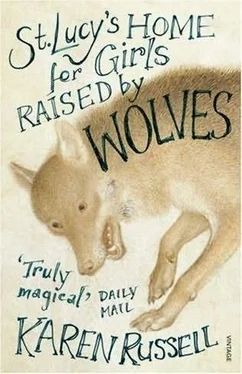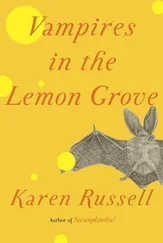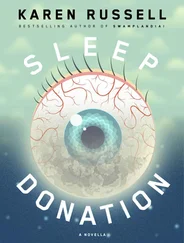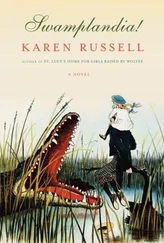One night I came back early from the closet and stumbled on Jeanette. She was sitting in a patch of moonlight on the windowsill, reading from one of her library books. (She was the first of us to sign for her library card, too.) Her cheeks looked dewy.
“Why you cry?” I asked her, instinctively reaching over to lick Jeanette’s cheek and catching myself in the nick of time.
Jeanette blew her nose into a nearby curtain. (Even her mistakes annoyed us — they were always so well intentioned.) She sniffled and pointed to a line in her book: “The lake-water was reinventing the forest and the white moon above it, and wolves lapped up the cold reflection of the sky.” But none of the pack besides me could read yet, and I wasn’t ready to claim a common language with Jeanette.
The following day, Jeanette golfed. The nuns set up a miniature putt-putt course in the garden. Sister Maria dug four sandtraps and got old Walter, the groundskeeper, to make a windmill out of a lawn mower engine. The eighteenth hole was what they called a “doozy,” a minuscule crack in St. Lucy’s marble dress. Jeanette got a hole in one.
On Sundays, the pretending felt almost as natural as nature. The chapel was our favorite place. Long before we could understand what the priest was saying, the music instructed us in how to feel. The choir director — aggressively perfumed Mrs. Valuchi, gold necklaces like pineapple rings around her neck — taught us more than the nuns ever did. She showed us how to pattern the old hunger into arias. Clouds moved behind the frosted oculus of the nave, glass shadows that reminded me of my mother. The mother, I’d think, struggling to conjure up a picture. A black shadow, running behind the watery screen of pines.
We sang at the chapel annexed to the home every morning. We understood that this was the humans’ moon, the place for howling beyond purpose. Not for mating, not for hunting, not for fighting, not for anything but the sound itself. And we’d howl along with the choir, hurling every pitted thing within us at the stained glass. “Sotto voce.” The nuns would frown. But you could tell that they were pleased.
Stage 4: As a more thorough understanding of the host culture is acquired, your students will begin to feel more comfortable in their new environment. Your students feel more at home, and their self-confidence grows. Everything begins to make sense.
“Hey, Claudette,” Jeanette growled to me on the day before the ball. “Have you noticed that everything’s beginning to make sense?”
Before I could answer, Mirabella sprang out of the hall closet and snapped through Jeanette’s homework binder. Pages and pages of words swirled around the stone corridor, like dead leaves off trees.
“What about you, Mirabella?” Jeanette asked politely, stooping to pick up her erasers. She was the only one of us who would still talk to Mirabella; she was high enough in the rankings that she could afford to talk to the scruggliest wolf-girl. “Has everything begun to make more sense, Mirabella?”
Mirabella let out a whimper. She scratched at us and scratched at us, raking her nails along our shins so hard that she drew blood. Then she rolled belly-up on the cold stone floor, squirming on a bed of spelling-bee worksheets. Above us, small pearls of light dotted the high, tinted window.
Jeanette frowned. “You are a late bloomer, Mirabella! Usually, everything’s begun to make more sense by Month Twelve at the latest.” I noticed that she stumbled on the word bloomer. HraaaHA! Jeanette could never fully shake our accent. She’d talk like that her whole life, I thought with a gloomy satisfaction, each word winced out like an apology for itself.
“Claudette, help me,” she yelped. Mirabella had closed her jaws around Jeanette’s bald ankle and was dragging her towards the closet. “Please. Help me to mop up Mirabella’s mess.”
I ignored her and continued down the hall. I had only four more hours to perfect the Sausalito. I was worried only about myself. By that stage, I was no longer certain of how the pack felt about anything.
At seven o’clock on the dot, Sister Ignatius blew her whistle and frog-marched us into the ball. The nuns had transformed the rectory into a very scary place. Purple and silver balloons started popping all around us. Black streamers swooped down from the eaves and got stuck in our hair like bats. A full yellow moon smirked outside the window. We were greeted by blasts of a saxophone, and fizzy pink drinks, and the brothers.
The brothers didn’t smell like our brothers anymore. They smelled like pomade and cold, sterile sweat. They looked like little boys. Someone had washed behind their ears and made them wear suspendered dungarees. Kyle used to be a blustery alpha male, BTWWWR! chewing through rattlesnakes, spooking badgers, snatching a live trout out of a grizzly’s mouth. He stood by the punch bowl, looking pained and out of place.
“My stars!” I growled. “What lovely weather we’ve been having!”
“Yeees,” Kyle growled back. “It is beginning to look a lot like Christmas.” All around the room, boys and girls raised by wolves were having the same conversation. Actually, it had been an unseasonably warm and brown winter, and just that morning a freak hailstorm had sent Sister Josephina to an early grave. But we had only gotten up to Unit 7: Party Dialogue; we hadn’t yet learned the vocabulary for Unit 12: How to Tactfully Acknowledge Disaster. Instead, we wore pink party hats and sucked olives on little sticks, inured to our own strangeness.
The nuns swept our hair back into high, bouffant hairstyles. This made us look more girlish and less inclined to eat people, the way that squirrels are saved from looking like rodents by their poofy tails. I was wearing a white organdy dress with orange polka dots. Jeanette was wearing a mauve organdy dress with blue polka dots. Linette was wearing a red organdy dress with white polka dots. Mirabella was in a dark corner, wearing a muzzle. Her party culottes were duct-taped to her knees. The nuns had tied little bows on the muzzle to make it more festive. Even so, the jazz band from West Toowoomba kept glancing nervously her way.
“You smell astoooounding!” Kyle was saying, accidentally stretching the diphthong into a howl and then blushing. “I mean—”
“Yes, I know what it is that you mean,” I snapped. (That’s probably a little narrative embellishment on my part; it must have been months before I could really “snap” out words.) I didn’t smell astounding. I had rubbed a pumpkin muffin all over my body earlier that morning to mask my natural, feral scent. Now I smelled like a purebred girl, easy to kill. I narrowed my eyes at Kyle and flattened my ears, something I hadn’t done for months. Kyle looked panicked, trying to remember the words that would make me act like a girl again. I felt hot, oily tears squeezing out of the red corners of my eyes. Shoesonfeet! I barked at myself. I tried again. “My! What lovely weather—”
The jazz band struck up a tune.
“The time has come to do the Sausalito,” Sister Maria announced, beaming into the microphone. “Every sister grab a brother!” She switched on Walter’s industrial flashlight, struggling beneath its weight, and aimed the beam in the center of the room.
Uh-oh. I tried to skulk off into Mirabella’s corner, but Kyle pushed me into the spotlight. “No,” I moaned through my teeth, “noooooo.” All of a sudden the only thing my body could remember how to do was pump and pump. In a flash of white-hot light, my months at St. Lucy’s had vanished, and I was just a terrified animal again. As if of their own accord, my feet started to wiggle out of my shoes. Mouth shut, I gasped, staring down at my naked toes, mouthshutmouthshut.
Читать дальше












